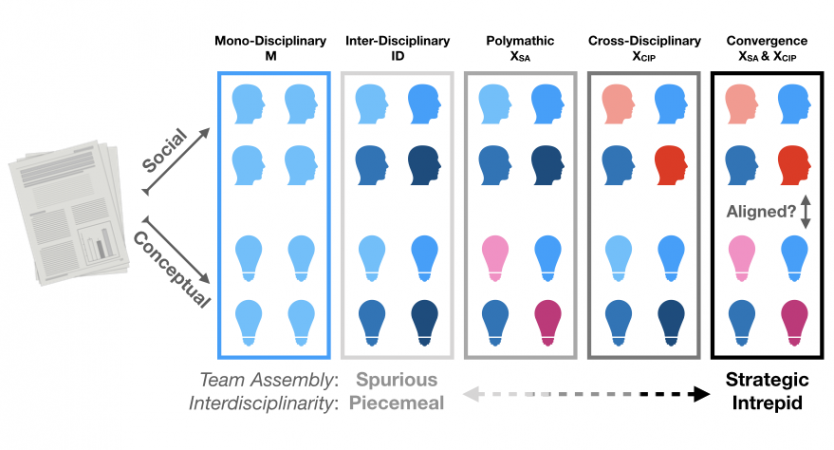
Study provides a framework for measuring and evaluating the emerging interdisciplinary paradigm of Convergence Science, and applies the framework to a convergence nexus of human brain science in order to gain insights into the alignment of social and conceptual dimensions that represent the solution and problem domains associated with mission-oriented grand challenges.
Abstract: Convergence science is an intrepid form of interdisciplinarity defined by the US National Research Council as “the coming together of insights and approaches from originally distinct fields” to strategically address grand challenges. Despite its increasing relevance to science policy and institutional design, there is still no practical framework for measuring convergence. We address this gap by developing a measure of disciplinary distance based upon disciplinary boundaries delineated by hierarchical ontologies. We apply this approach using two widely used ontologies – the Classification of Instructional Programs (CIP) and the Medical Subject Headings (MeSH) – each comprised of thousands of entities that facilitate classifying two distinct research dimensions, respectively. The social dimension codifies the disciplinary pedigree of individual scholars, connoting core expertise associated with traditional modes of mono-disciplinary graduate education. The conceptual dimension codifies the knowledge, methods, and equipment fundamental to a given target problem, which together may exceed the researchers’ core expertise. Considered in tandem, this decomposition facilitates measuring social-conceptual alignment and optimizing team assembly around domain-spanning problems – a key aspect that eludes other approaches. We demonstrate the utility of this framework in a case study of the human brain science (HBS) ecosystem, a relevant convergence nexus that highlights several practical considerations for designing, evaluating, institutionalizing and accelerating convergence. Econometric analysis of 655,386 publications derived from 9,121 distinct HBS scholars reveals a 11.4% article-level citation premium attributable to research featuring full topical convergence, and an additional 2.7% citation premium if the social (disciplinary) configuration of scholars is maximally aligned with the topical configuration of the research.
Read the article published in Research Evaluation (2023), and see the lightning talk summary, along with related work on convergence science published in Advances in Complex Systems (2023), American Scientist (2022) and Nature Humanities and Social Sciences Communications (2021).



